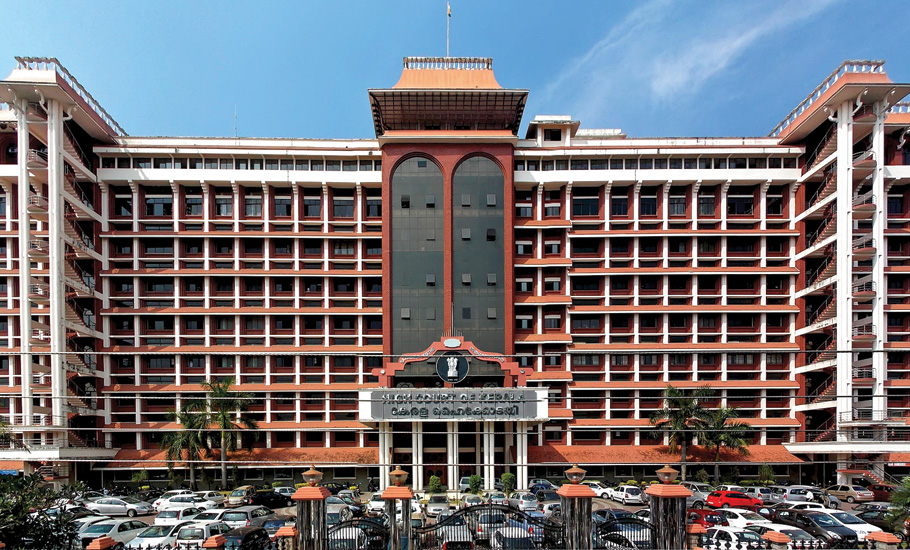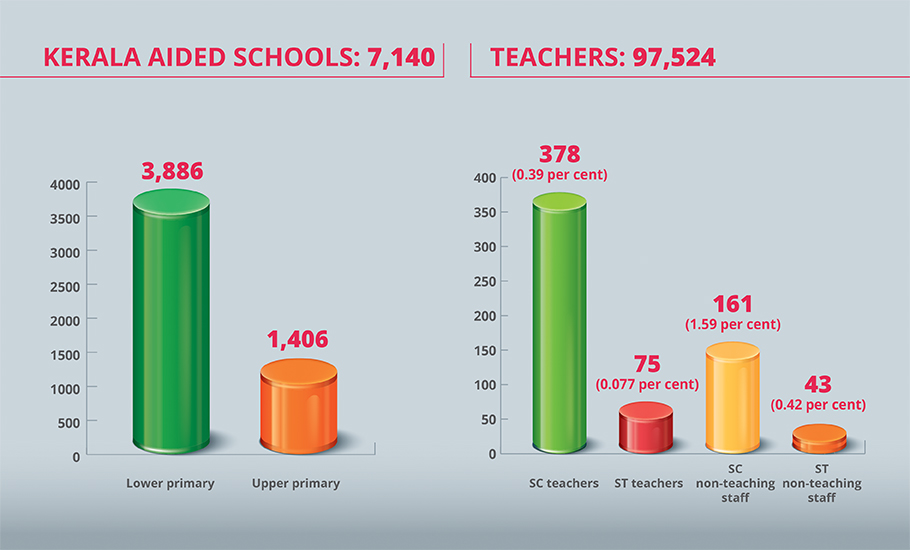

- Home
- News
- Analysis
- States
- Perspective
- Videos
- Education
- Entertainment
- Elections
- World Cup 2023
- Features
- Health
- Business
- Series
- Economy Series
- Earth Day
- Kashmir’s Frozen Turbulence
- India@75
- The legend of Ramjanmabhoomi
- Liberalisation@30
- How to tame a dragon
- Celebrating biodiversity
- Farm Matters
- 50 days of solitude
- Bringing Migrants Home
- Budget 2020
- Jharkhand Votes
- The Federal Investigates
- The Federal Impact
- Vanishing Sand
- Gandhi @ 150
- Andhra Today
- Field report
- Operation Gulmarg
- Pandemic @1 Mn in India
- The Federal Year-End
- The Zero Year
- Premium
- Science
- Brand studio
- Home
- NewsNews
- Analysis
- StatesStates
- PerspectivePerspective
- VideosVideos
- Entertainment
- ElectionsElections
- Sports
- Loading...
Sports - Features
- BusinessBusiness
- Premium
- Loading...
Premium

Social injustice: How Kerala’s aided education institutions alienate marginalised groups

Bishop Chulaparambil Memorial College, Kottayam, owned and managed by the Corporate Educational Agency of Colleges of the Archeparchy of Kottayam for the Knanaya Catholic Community is one of the most well-known women’s colleges under Mahatma Gandhi University, Kerala. The college has 14 non-teaching staff members and 37 teachers, none hail from the Scheduled Castes or Scheduled Tribes. In...
Bishop Chulaparambil Memorial College, Kottayam, owned and managed by the Corporate Educational Agency of Colleges of the Archeparchy of Kottayam for the Knanaya Catholic Community is one of the most well-known women’s colleges under Mahatma Gandhi University, Kerala. The college has 14 non-teaching staff members and 37 teachers, none hail from the Scheduled Castes or Scheduled Tribes. In fact, none of them are non-Christians.
The NSS Training College in Pandalam in Pathanamthitta district employs 22 people, including 16 teachers and 6 non-teaching staff members, all of whom are Nairs. During the recruitment process, no one from the backward communities was offered a job.
Out of the 15 employees of Nusrathul Islam Arabic College, Kadavathur in Kannur district, no one is a non-Muslim.
The three examples, established through a RTI reply received in 2018, from Kerala’s public education sector stand testimony to the fact that concepts of social justice and representation of the marginalised sections go for a toss when it comes to appointment at government-aided private educational institutions.
“In these institutions, not only social justice is denied to the marginalised communities, but they are also systematically alienated from aided sector jobs. Their only option for SCs is the 8 per cent reservation in government jobs. The social mobility they have attained through reservation in education, hits a roadblock when it comes to getting a job. They are structurally denied multilevel social mobility,” Dr Rekha Raj, a Dalit scholar and activist tells The Federal.

Although government pays the salaries and pension for teaching and non-teaching staff and provides grant for maintenance in aided schools and colleges from the exchequer, it only plays a small part – which is vetting the qualifications of the candidates and approving the appointment – in the recruitment process. The budget allocation in 2019-20 for salary and other allowances of the staff in aided educational institutions amounted to Rs 18,434 crore.
“It is disappointing that even six decades after the state was founded, there is still no solution to the problem of marginalised communities being excluded from the process of nation-building through education. This is due to the fact that majority of the state’s schools are run by managements with sway over politics, the economy, and society,” reads a 2017 report of the Kerala legislative assembly committee, for the welfare of youth and youth affairs (2017-19) headed by then MLA and CPI(M) leader TV Rajesh. The report was submitted on May 18, 2017, but no action followed up.
Data suggests more than 60 per cent of the public education sector is run by private management, predominantly the Christian denominations. Muslim organisations, Nair Service Society (NSS) and Sree Narayana Dharma Paripalana Yogam (SNDP) are the other players in public education sector.
Of the total 232 public colleges in Kerala in 2014-15, 180 were aided institutions. Eighty-six out of the 180 colleges (47 per cent) are run by the Christian managements, whereas various Muslim organisations have control over 35 colleges (19 per cent). SNDP and NSS account for 38 colleges with the former having 20. The government-controlled Devaswom boards run seven colleges and 12 colleges are managed by individuals.
As far as the schools are concerned, there are 7,140 aided schools functioning under the Directorate of Public Instruction (DPI), of which 3,886 are lower primary schools, 1,848 upper primary schools and 1,406 high schools. A total of 97,524 teachers work in this sector across primary and secondary schools, with only 378 (0.39 per cent) coming from the SC and 75 (0.077 per cent) from ST communities, according to 2016 data that is currently available with the DPI. Only 161 (1.59 per cent) members of the scheduled caste and 43 (0.42 per cent) members of the scheduled tribe make up the non-teaching staff.
According to the 2011 census, SCs make up 9.1 per cent and STs 1.45 of Kerala’s population. Which means that in order to achieve parity with others, SCs must receive at least 8,874 appointments and STs 1,414.
On the other hand, the castes and religions that own these institutions are obscenely overrepresented.
The assembly committee after conducting a detailed study and hearing from the officials, submitted a six-pointed proposal before the house, which is yet to be taken to any logical conclusion. The committee recommended
1) The reservation policy should be implemented for aided schools on the lines of that prevailing in government schools and the SC/ST candidates should be given deserving representation in recruitment
2) The recruitment process for aided educational institutions should be standardised and it should be handed over to the Kerala public service commission
3) A permanent monitoring mechanism should be in place to ensure that recruitments to aided institutions complied with the reservation norms.
4) Reservation for SC/ST candidates should be given in recruitment to promotion posts such as headmaster and principal also
5) Institutions with a minority status should take seniority and qualifications into account when recruiting and promoting employees
6) As the higher secondary educational institutions do not have many posts of non-teaching staff, the government should consider creating the same and recruitment should be carried out as per the reservation policy
“I am not aware of any follow up action on the report. The government had plans to implement the suggestions, but it did not take off for some reasons,” says IB Sathish, a CPI(M) MLA, who was a member of the committee. “After media reports on the government’s plan to introduce reservations in the aided sector, there was confusion and it got stalled,” added the MLA.
“The reason for non-implementation of these suggestions is purely political. No government that ruled the state wanted to antagonise the dominant community organisations. Last year, CPI(M) central committee member, and former minister AK Balan had opined that the recruitment should be handed over to the public service commission only to be overridden by his party leadership,” says OP Raveendran, a teacher and the author of Private Colonies in the Public Education Scene, a book on reservation in the government-aided educational institutions.
Raveendran’s data driven book makes the case that the hiring procedure does not uphold the concept of social justice or equal opportunity.
“In fact, this is a very delicate subject. The CPI(M) is strongly in favour of implementing reservations in institutions receiving government aid. The issue has not yet been formally discussed by the LDF. In 2013 or 2014, there was an attempt to start a discussion about the issue, but the private managements boycotted the meeting. The government is currently attempting to launch a new round of negotiations in the hope of moving forward,” K Radhakrishnan, minister for the welfare of SC/ST communities, told The Federal.
He added that there are numerous reasons why this cannot be done forcibly, including the litigations that are pending in the courts.
“The same organised and dominant communities that overthrew Kerala’s first Communist government through the ‘liberation struggle’ are now holding government at gunpoint,” claims Raveendran.
He believes that the Dalits and Adivasis of the state are the ones who suffered because both the LDF and UDF-led governments bowed to their pressure at different points.
The history of government-aided educational institutions in modern day Kerala dates backs to the 19th century declaration of Rani Gauri Parvathy Bhai of Travancore. Many educational historians regard the Queen’s proclamation of 1817 as Travancore’s ‘Magna Carta of Education’ and with good reason.
Professor Joseph Mundasseri, the education minister of the first elected Communist government, in 1958, introduced the education bill in the Kerala assembly. The bill, which attempted to regulate the operation of educational institutions, including standardising curricula and pay structures, in order to eliminate the malpractices invited the wrath of the Catholic church and NSS, resulting in them joining hands with the opposition parties, including the Congress, to start a ‘liberation struggle’ to over throw the government.
As per the original Section 11 of the Kerala Education Act of 1958, which was considered as revolutionary in nature, the Kerala Public Service Commission (PSC) was proposed to be given the responsibility of appointing teachers. However, that section was repealed in 1960 as a result of the ‘liberation struggle’ against the first Communist regime, giving the authority back to school managers.
It was in 1972, following a fierce protest by the teacher’s association, that the then government, a coalition of the Congress and CPI, led by C Achutha Menon, instituted the direct payment system to distribute salaries to the staff of aided colleges. Since then, the government has been paying the salaries and pension for the employees, but the managers of these institutions do not comply with the reservation rules.
As per multiple orders of the University Grants Commission, reservation rules must be complied in appointments to grant-in-aid institutions, with the exception of those run by minority communities protected under Article 30 of the Constitution.
A group of aspirant teachers, who approached the Kerala High Court in 2010, received a favourable order in 2014, which was overturned by the division bench in 2017. The case is under consideration of the Supreme Court of India.
“Almost all the upper caste communities run colleges in the state and they do not employ anyone from any communities that come under reservation, let alone any Scheduled Caste or Scheduled Tribe. I could see this only as an organised move to marginalise the reserved category, especially Dalits and Adivasis,” says Dr Rekha Raj, who is one among the applicants who approached the Kerala HC in 2010.
Aided schools have shown reluctance in ensuring reservations to other disadvantaged groups as well. It took a Kerala High Court order even for physically challenged persons to get their fair share of reservation in these institutions. Following the court order, the Kerala government has issued an order to maintain 4 per cent reservation for the differently abled by adapting a horizontal reservation policy.
Dependents of teachers in aided schools, who die in harness, are another category that got reservation only after the intervention of courts.
It now remains to be seen how long it takes for the institutions to allow social and religious diversity on campuses.

